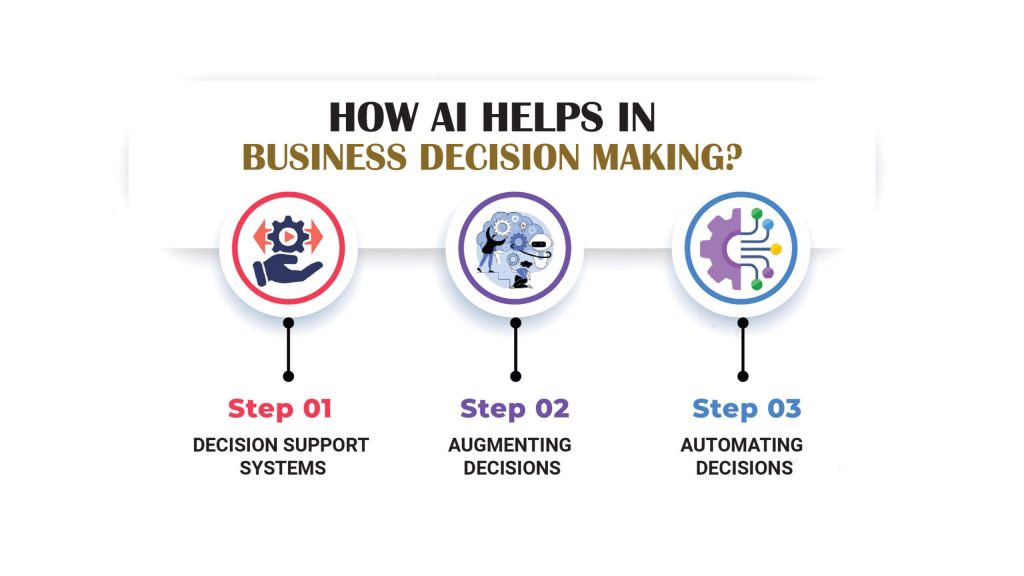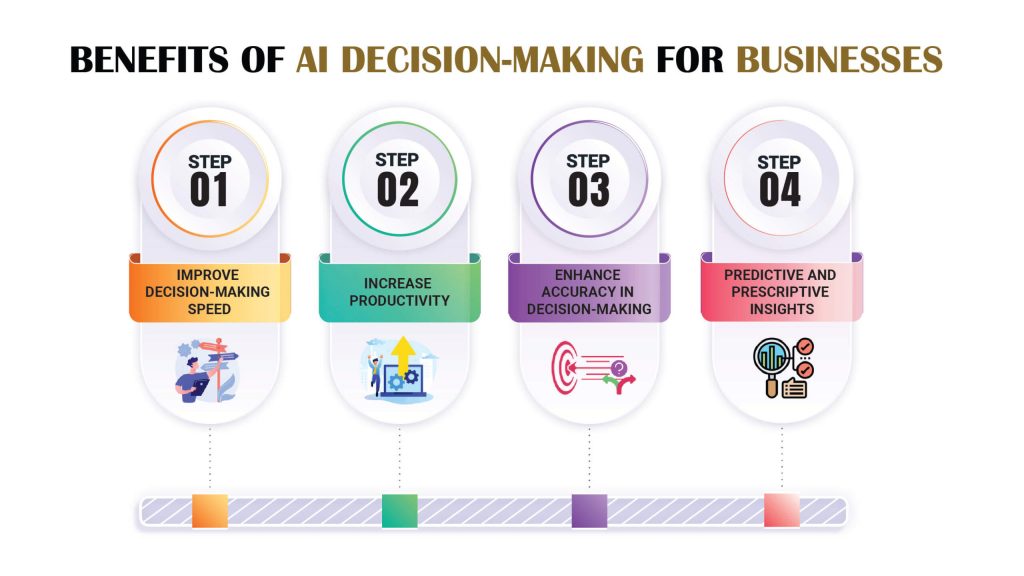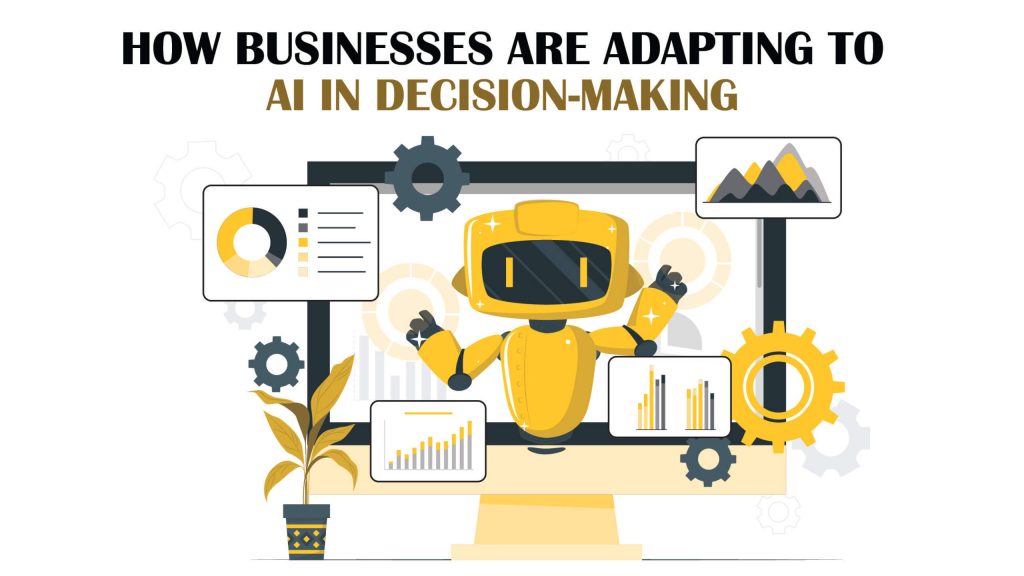Introduction
Decision-making is crucial for every business, regardless of the type and industry. It has the power to make or break your business.
Thank you for reading this post, don't forget to subscribe!One bad decision and your business are screwed.
However, in these rapidly evolving market trends and customer preferences, it is difficult for decision-makers to make the right decisions on the go.
So, What leading businesses like Amazon, Google, Netflix, Spotify, and others are leveraging to make better and faster business decisions.
Well, it’s a brainer. It is AI. Artificial Intelligence. As per Statista Reports, the AI market which was once valued at 93.27 Billion Dollars in 2020 is now valued at 243.72 in 2025 and is estimated to reach over 800 Billion dollars in 2030. That’s incredible growth, right?
But, can we trust AI for decision-making, and How are businesses adapting to AI in Decision-Making?
Well, to get an answer to this & everything in between, this blog is all you need.
Leveraging analytics and AI for more efficient, insightful strategy decisions is one of the biggest challenges and opportunities, corporate strategists face.
David Akers, Director, Research at Gartner
Also Read: How AI Unlocks Business Insights that Drive Required Results
Traditional Decision Making vs AI Decision Making
1. Traditional Decision Making:
In the past, manual decision-making required humans to gather, clean, and analyze data themselves. This process was often time-consuming and prone to errors.
Humans had to rely heavily on their expertise, which, while valuable, could be limited by personal biases, inconsistencies in data interpretation, and the sheer volume of data.
Additionally, humans can struggle with making quick decisions when faced with overwhelming information or varying opinions, and they may get stuck in old habits. These challenges make manual decision-making less efficient and can lead to missed opportunities or costly mistakes.
Also Read: Benefits of Data-Driven Decision Making
2. AI Decision Making:
AI, on the other hand, simplifies and speeds up the decision-making process by automating data collection, cleaning, and analysis. It can process vast amounts of data at once, without being slowed down by complexity or contradictions.
It doesn’t have the same biases or limitations as humans and can learn from every decision made, improving its accuracy over time.
That being said, it is also true that AI doesn’t right away eliminate the human element in decision-making. Instead, it improves the human capabilities to make better decisions with less effort and in less time.
According to a recent Gartner survey, 79% of corporate strategists believe AI, automation, and analytics will be the most important drivers of business success in the coming two years.
Also Read: Improved Decisions Through Decision Intelligence
What is AI decision-making?
AI isn’t just a platform that helps businesses collect data and gives recommendations. Instead, it includes collecting data, analyzing data, data transformation, and even predictive intelligence capabilities to make data-driven decisions.
The artificial Intelligence platform is enriched with powerful technologies like machine learning (ML), artificial intelligence (AI), natural language processing (NLP), and predictive analytics to sift through mountains of data.
This isn’t just about understanding what’s happening now; AI dives into past trends, studies current market conditions, predicts future shifts, and even keeps an eye on what your competitors are doing.
Whether it’s deciding on the right pricing strategy, choosing the next market to enter, or identifying customer segments to target, AI combines historical data, current trends, and future possibilities to give you actionable, well-rounded recommendations.
All in all, AI offers a holistic, data-driven approach to decision-making, backed by complex algorithms that learn and evolve. It helps businesses move beyond guesswork, making smarter, faster decisions that are rooted in real-time insights and future predictions.
Also Read: How do Machine Learning and Artificial Intelligence Help Businesses
How AI Helps in Business Decision Making?
Artificial Intelligence when combined with human intelligence has the ability to transform decision intelligence for companies at the core. It can automate so many repetitive activities to power through the decision-making and make the informed decisions that take businesses to new heights of success. Let’s find out how.

1. Decision Support Systems:
With the current data, people cannot sort and clearly slot them on their own. The process is time-intensive and resource-intensive. However, AI offers quick assistance by reviewing, slotting, identifying trends, and turning them into easy-to-understand reports or presentations.
With its decision support, it puts you in the commanding position while completing difficult tasks and paving the path for data decision-making. For instance, it can quickly identify leaks in the sales pipeline, which could aid in intelligent inventory control.
According to a PwC survey, 54% of executives believe that adopting AI for decision-making and other tasks has already increased productivity in their firm.
Also Read: Decision intelligence Vs Business Intelligence
2. Augmenting Decisions:
AI doesn’t just help businesses gather data—it also helps people make better predictions and decisions using advanced analytics. This technology enables human users to perform predictive or prescriptive analysis.
- Predictive analytics: Make predictions about the future using past data.
- Prescriptive analytics: Make the best recommendations based on boundaries and predictions.
Also Read: How Predictive Intelligence Transforms Retail
3. Automating Decisions:
AI takes decision-making a step further by automating certain processes with decision augmentation. By setting predefined rules and integrating predictive and prescriptive analytics, AI offers high-speed, scalable, and consistent decision-making capabilities, especially for complex tasks.
- Optimization models: Determine the optimal solution to a problem under specified limitations.
- Recommendation Systems: Suggest things or actions based on user preferences and behaviors.
- Models for Risk Assessment: Assess possible hazards and their consequences.
Also Read: How the Data Analytics Process Automation Help Businesses
Benefits OF AI Decision-Making For Businesses

1. Improve Decision-Making Speed:
These days, business moves quickly, so having the capacity to make judgments quickly is essential. Businesses can react quickly to shifting consumer demands and market situations thanks to AI systems’ real-time data processing and insight generation capabilities.
AI automates data analysis and decision-making processes, eliminating the time-consuming chores of manual data collection and interpretation.
This speeds up the decision-making process and gives decision-makers a competitive edge by letting them concentrate on strategic projects while AI takes care of the tedious work.
Also Read: Two Way Data Analytics in Shaping Retail Businesses
2. Increase productivity:
Even the most committed workers can only put in so many hours in a day, let’s face it. AI can help with it. It’s like having a dedicated helper who processes data and offers insights all day long. Do you require quick fixes or real-time analysis? AI is on your side.
By utilizing AI’s round-the-clock capabilities, people can increase their output and free up time for strategic planning and decision-making.
Of course, AI is not a substitute for human judgment; rather, it is a tool that expands our capacities. Consider it an increase in productivity that enables you to operate more efficiently rather than more laboriously.
Also Read: How to Increase Sales Without Advertising
3. Enhance Accuracy in Decision-Making:
You might be aware of the fact that – traditional decision-making heavily relies on only human intuition and manual data analysis as humans are supposed to make decisions, which can lead to biases and errors in business decision-making.
As per one report by Deloitte – 47% of businesses stated that data inaccuracy is among the major barriers to effective decision-making.
But, AI comes to the rescue and removes the guesswork by analyzing massive datasets objectively, ensuring decisions are based on accurate, unbiased data and not only on human intuition. It uses algorithms to identify patterns and correlations that human analysts might miss.
Take JP Morgan Chase for example. Its AI system, (COiN), processes thousands of legal documents daily, ensuring decisions are based on accurate and comprehensive information.
Also Read: How AI unlocks Business Insights the Drive Required Results
4. Predictive and Prescriptive Insights:
Traditional methods focus only on historical data, making it challenging to predict future trends or prescribe actions. Because it is challenging for humans to predict the future and make the right decisions.
However, Predictive analytics uses historical data to forecast outcomes, while prescriptive analytics suggests the best course of action based on these predictions with its machine learning capabilities.
For instance, Amazon employs AI to anticipate customer purchasing behavior. By analyzing browsing habits and past purchases, its recommendation engine generates 35% of the company’s revenue, as reported by McKinsey Global Institute. These insights allow businesses to make forward-thinking decisions and seize opportunities early.
1. Risk Mitigation and Decision Confidence:
Identifying risks in traditional decision-making often involves manual audits or after-the-fact corrections, which are neither proactive nor efficient. AI plays a vital role in identifying and mitigating risks in real time to make data-driven decisions.
By identifying potential risks before they escalate, AI empowers businesses to make informed, low-risk decisions confidently.
For instance, HSBC uses machine learning algorithms to detect fraudulent transactions in real-time, improving accuracy by 30%.
2. Scalability in Decision-Making:
As businesses grow, data also grows. It becomes quite difficult for businesses to cope with all the data and make data-driven decisions. This is a major problem with the traditional decision-making process, leading to delays and inefficiencies.
But, with the right AI platform – scalability is not a problem. It can grow with your business. AI scales effortlessly, processing and analyzing vast datasets from diverse sources.
This scalability allows businesses to maintain agility and efficiency, even as they expand. So, even if your business grows and the data load increases – the scalable AI platform can grow and cope with increased data needs.
When you choose the scalable AI platform – it comes with flexible pricing models – that you can scale up & down as & when needed. It matches your business needs + stays within your budget. A win-win.
3. Increase Competitive Advantage:
Traditional decision-making often lagged behind market trends due to lengthy data processing times. This made it difficult for businesses to stay ahead of competitors or adapt to disruptions.
AI continuously analyzes vast amounts of data from various sources—customer behavior, market trends, competitor strategies, and more in real-time. This enables businesses to identify emerging trends, predict market demands, and make informed decisions – helping companies achieve a competitive edge.
According to PwC, companies leveraging AI for market analysis grow revenue up to 50% faster than their competitors.
4. Unlock Hidden Opportunities:
There are so many subtle patterns or correlations within the data, that humans might miss out on leaving valuable opportunities undiscovered. It can lead to missed opportunities and untapped business potential.
However, that is not the case with AI. It dives deeper into datasets to uncover data insights that traditional methods overlook. It even highlights the crucial data and generates real-time reports – that decision-makers can leverage to make decisions on the go.
For instance, let’s consider Target – a leading retail chain having stores across the globe. They used predictive analytics and identified that there are so many expectant mothers who contribute to the total sales – so based on shopping habits, they targeted this demographic with tailored offers. This strategy increased revenue from new parents by 20%.
5. Getting the pricing right:
The pricing can make or break your business. If your price is high – the customers will shift to competitors and if it’s too low – you are draining your profits. So, you need to find the perfect middle ground.
However, setting the right price required extensive market research, sifting through mountains of data, trial-and-error approaches, and making traditional pricing strategies slow and often misaligned with market conditions.
But, with AI – it helps you analyze all the factors – historical data, competitor pricing, current market preferences, future trends, your costing and everything in between to choose the right pricing. Plus, it also comes with dynamic pricing models that adjust prices in real time based on demand, competitor pricing, and market trends. Through AI, promotions pricing has also become simpler.
Some of the leading retailers like Zara use AI to analyze customer demand and optimize pricing across their global stores, ensuring competitiveness and maximizing profits.
6. Limited Innovation in Product Development:
Traditional product development processes relied heavily on intuition or slow market research, which often failed to align with customer needs or preferences. A survey by Accenture found that 72% of new products fail to meet revenue expectations due to a lack of customer insight during development.
AI accelerates and improves product development by analyzing customer feedback, market trends, and competitor offerings. For example, PepsiCo launched its snack product line “Stacy’s Pita Chips” after identifying consumer demand for healthier snacking options through AI-driven market research. This data-backed approach contributed to Stacy’s becoming a $1 billion brand.
AI also facilitates rapid prototyping. Companies like Nike use AI to simulate product performance and test consumer preferences digitally, reducing time-to-market and increasing product success rates.
Also Read: Choosing the Right AI Data Platform for your Business
Choose the Best AI Tool to Make Better & Faster Business Decisions!
The benefits of AI in business decision-making are truly limitless, especially when paired with human intelligence. But the secret to maximizing these benefits—achieving better results at lower costs—lies in selecting the right AI platform. A platform tailored to your business and industry needs, equipped with powerful features, and easy to use will deliver the most value.
If you’re searching for such a solution, Livelytics has got you covered. It collects, analyzes, and transforms data into actionable insights, empowering you to make informed decisions quickly. It even provides real-time reports and predictive analytics to ensure you are always ahead of the curve. Designed for industries like restaurants, insurance, salons, finance,retail, and hospitality it can help them redefine decision intelligence. Livelytics even offers customizable options tailored to your specific goals.
Its flexibility shines with subscription pricing that works for businesses of all sizes. To know more about Livelytics, and how it helps and fits into your business – book your free demo right away.
The Future of AI in Decision-Making
AI has just started doing the more crucial tasks – but the future looks bright, promising, and efficient. Let’s look into it:
- From Insight to Foresight: Future AI systems won’t just analyze—they’ll anticipate, helping leaders stay three steps ahead. With tools that decode complexities, making informed choices will feel second nature.
- Decisions in a Blink: In fast-paced sectors like finance and insurance, AI will make split-second decisions that humans can’t. Think autopilots for businesses—accurate, safe, and efficient.
- Sustainability at the core: AI will master sustainability as well by optimizing resources, ensuring businesses thrive while helping the planet.
- Artificial & Human Intelligence: The future is teamwork! AI will partner with humans, offering creative solutions and handling the heavy lifting, so we focus on innovation.
- Stick to Regulations: Regulations will ensure AI evolves responsibly, balancing innovation with ethics. The result? Smarter, fairer decisions that everyone trusts.
Conclusion
The integration of artificial intelligence into business decision-making has fundamentally changed how businesses analyze data and make decisions.
AI has been useful in digesting the vast volume, diversity, and velocity of information available today, allowing for more informed decisions. AI, when combined with human intelligence in a supervised situation, has the potential to significantly improve decision-making, value, efficiency, and productivity.
As AI gets more incorporated into a company’s DNA, new and improved AI practices emerge – businesses who have a firm understanding of AI principles will probably have a big advantage over competitors.
So, it is important to choose the right AI tool that understands your business needs and offers the best solutions accordingly. As we have covered – Livelytics is everything you need.
